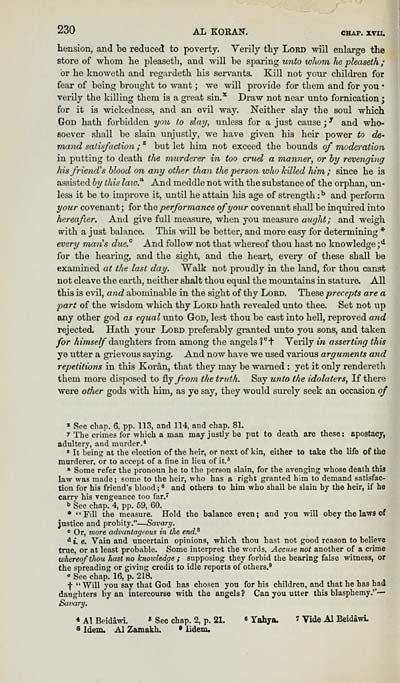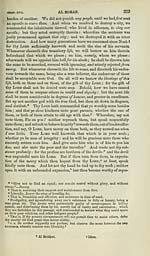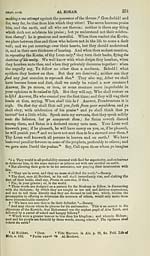Download files
Complete book:
Individual page:
Thumbnail gallery: Grid view | List view

230 AL KORAN. CHAP. XVII.
hension, and he reduced to poverty. Yerily thy Lord will enlarge the
store of whom he pleaseth, and will be sparing unto whom he pleaseth ;
or he knoweth and regardeth his servants. Kill not your children for
fear of being brought to want ; we will provide for them and for you •
verily the killing them is a great sin.* Draw not near unto fornication ;
for it is wickedness, and an evil way. Neither slay the soul which
God hath forbidden yoit to slay, unless for a just cause ; ^ and who-
soever shall be slain unjustly, we have given his heir power to cfe-
mand satisfaction ; ^ but let him not exceed the bounds of moderation
in putting to death tlie murderer in too cruel a manner, or hy revenging
his friend's blood on any other than the person who killed htm ; since he is
assisted hy this law.^ And meddle not with the substance of the orphan, un-
less it be to improve it, until he attain his age of strength : ^ and perform
your covenant ; for the performance of your covenant shall be inquired into
hereafter. And give full measure, when you measure aught; and weigh
with a just balance. This will be better, and more easy for determining *
every man's due.° And follow not that whereof thou hast no knowledge ;*^
for the hearing, and the sight, and the heart, every of these shall be
examined at the last day. Walk not proudly in the land, for thou canst
not cleave the earth, neither shalt thou equal the mountains in stature. All
this is evil, and abominable in the sight of thy Lord. These precepts are a
part of the wisdom which thy Lord hath revealed unto thee. Set not up
any other god as equal unto God, lest thou be cast into hell, reproved and
rejected. Hath your Lord preferably granted unto you sons, and taken
for himself daughters from among the angels I'^t Verily in asserting this
ye utter a grievous saying. And now have we used various arguments and
repetitions in this Koran, that they may be warned : yet it only rendereth
them more disposed to fly /row the truth. Say unto the idolaters. If there
wei-e other gods with him, as ye say, they would surely seek an occasion of
* See chap. 6, pp. 113, and 114, and chap. 81.
y The crimes for which a man may justly be put to death are these: apostacy,
adultery, and murder.*
'■ It being at the election of the heir, or next of kin, either to take the life of the
murderer, or to accept of a fine in lieu of it.*
■ Some refer the pronoun he to the person slain, for the avenging whose death this
law was made; some to the heir, who has a right granted him to demand satisfac-
tion for his friend's blood ; * and others to him who shall be slain by the heir, if he
carry his vengeance too far.^
*> See chap. 4, pp. 69, 60.
* ' ' Fill the measure. Hold the balance even ; and yon will obey the laws of
justice and probity." — Savary.
" Or, more advantageous in the end.^
^ i. e. Vain and uncertain opinions, which thou hast not good reason to believe
true, or at least probable. Some interpret the words, Accuse not another of a crime
whereof thou hast no knowledge ; supposing they forbid the bearing false witness, or
the spreading or giving credit to idle reports of others.'
« See chap. 16, p. 218.
f " Will you say that God has chosen you for his children, and that he has hao
daughters by an intercourse with the angels ? Can you utter this blasphemy.'' —
Sai'ary.
* Al Beidawi. » See chap. 2, p. 21. 8 Yahya. 1 Vide Al Beidawi.
« Idem. Al Zamakh. * lidenu
hension, and he reduced to poverty. Yerily thy Lord will enlarge the
store of whom he pleaseth, and will be sparing unto whom he pleaseth ;
or he knoweth and regardeth his servants. Kill not your children for
fear of being brought to want ; we will provide for them and for you •
verily the killing them is a great sin.* Draw not near unto fornication ;
for it is wickedness, and an evil way. Neither slay the soul which
God hath forbidden yoit to slay, unless for a just cause ; ^ and who-
soever shall be slain unjustly, we have given his heir power to cfe-
mand satisfaction ; ^ but let him not exceed the bounds of moderation
in putting to death tlie murderer in too cruel a manner, or hy revenging
his friend's blood on any other than the person who killed htm ; since he is
assisted hy this law.^ And meddle not with the substance of the orphan, un-
less it be to improve it, until he attain his age of strength : ^ and perform
your covenant ; for the performance of your covenant shall be inquired into
hereafter. And give full measure, when you measure aught; and weigh
with a just balance. This will be better, and more easy for determining *
every man's due.° And follow not that whereof thou hast no knowledge ;*^
for the hearing, and the sight, and the heart, every of these shall be
examined at the last day. Walk not proudly in the land, for thou canst
not cleave the earth, neither shalt thou equal the mountains in stature. All
this is evil, and abominable in the sight of thy Lord. These precepts are a
part of the wisdom which thy Lord hath revealed unto thee. Set not up
any other god as equal unto God, lest thou be cast into hell, reproved and
rejected. Hath your Lord preferably granted unto you sons, and taken
for himself daughters from among the angels I'^t Verily in asserting this
ye utter a grievous saying. And now have we used various arguments and
repetitions in this Koran, that they may be warned : yet it only rendereth
them more disposed to fly /row the truth. Say unto the idolaters. If there
wei-e other gods with him, as ye say, they would surely seek an occasion of
* See chap. 6, pp. 113, and 114, and chap. 81.
y The crimes for which a man may justly be put to death are these: apostacy,
adultery, and murder.*
'■ It being at the election of the heir, or next of kin, either to take the life of the
murderer, or to accept of a fine in lieu of it.*
■ Some refer the pronoun he to the person slain, for the avenging whose death this
law was made; some to the heir, who has a right granted him to demand satisfac-
tion for his friend's blood ; * and others to him who shall be slain by the heir, if he
carry his vengeance too far.^
*> See chap. 4, pp. 69, 60.
* ' ' Fill the measure. Hold the balance even ; and yon will obey the laws of
justice and probity." — Savary.
" Or, more advantageous in the end.^
^ i. e. Vain and uncertain opinions, which thou hast not good reason to believe
true, or at least probable. Some interpret the words, Accuse not another of a crime
whereof thou hast no knowledge ; supposing they forbid the bearing false witness, or
the spreading or giving credit to idle reports of others.'
« See chap. 16, p. 218.
f " Will you say that God has chosen you for his children, and that he has hao
daughters by an intercourse with the angels ? Can you utter this blasphemy.'' —
Sai'ary.
* Al Beidawi. » See chap. 2, p. 21. 8 Yahya. 1 Vide Al Beidawi.
« Idem. Al Zamakh. * lidenu
Set display mode to: Large image | Transcription
Images and transcriptions on this page, including medium image downloads, may be used under the Creative Commons Attribution 4.0 International Licence unless otherwise stated. ![]()
| Early Gaelic Book Collections > J. F. Campbell Collection > Koran: or, Alcoran of Mohammed > (384) |
|---|
| Permanent URL | https://digital.nls.uk/77138319 |
|---|
| Description | Volumes from a collection of 610 books rich in Highland folklore, Ossianic literature and other Celtic subjects. Many of the books annotated by John Francis Campbell of Islay, who assembled the collection. |
|---|
| Description | Selected items from five 'Special and Named Printed Collections'. Includes books in Gaelic and other Celtic languages, works about the Gaels, their languages, literature, culture and history. |
|---|

